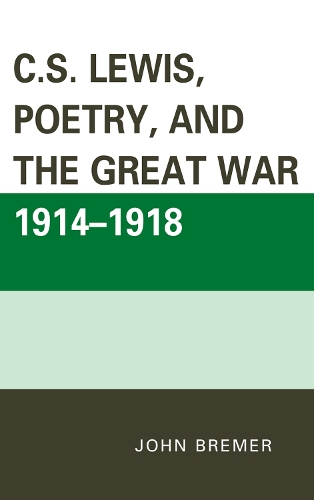
C.S. Lewis, Poetry, and the Great War 1914-1918
(Paperback)
Publishing Details
C.S. Lewis, Poetry, and the Great War 1914-1918
By (Author) John Bremer
Bloomsbury Publishing PLC
Lexington Books
27th May 2014
United States
Classifications
Tertiary Education
Non Fiction
Literary studies: general
821.912
Physical Properties
Paperback
276
Width 153mm, Height 228mm, Spine 20mm
422g
Description
The life and work of C.S. Lewis after his conversion in 1931 is well known and his reputation shows no signs of diminishing. His earlier years have not been so well studied, particularly between the ages of 16 and 22 when he studied privately and at Oxford, served in the British army, was wounded in France, entered into his affair with Janie Moore, and wrote and published his first book of poems. To correct and augment the limited accounts of this period, Lewiss life is presented with the general and specific background which makes it more meaningful, particularly as it throws light on his character. The romantic myth of him as a "soldier-poet" is dispelled, largely through an extensive review of the poems in "Spirits in Bondage" and the self-centered life that produced them. A valuable comparisonnot to the advantage of Lewisis drawn with two undoubted soldier-poets, Robert Graves and Siegfried Sassoon. The purpose is not to disparage or belittle Lewis but to show what had to be overcome in his limited and unpleasant early moral character in order to produce the devoted Christian of later years.
Reviews
This important book is a much-needed analysis of C.S. Lewiss youth, experiences in the Great War, and early poetry. It is clear-sighted and vigorously written, and a welcome corrective to assumptions that have crept into some writing about this period in Lewiss life. Bremers premise that Lewis was a poet influenced by war but not a war-poet is a sound one, well supported by comparisons to Graves and Sassoon. While not affording Spirits in Bondage more importance than its proper due as a young mans ambitious first attempt at a poetry cycle, Bremers thorough discussion of each poem grants us great insight into the pre-conversion Lewiss character, so different from the mature fantasist and Christian apologist with whom so many readers are familiar. -- Janet Brennan Croft, Associate Professor, University of Oklahoma
This is a fresh reading of C. S. Lewiss service in WWI as well as a helpful discussion of the poetry Lewis wrote during this time. -- Don W. King, professor of English, Montreat College
This book's title is an accurate guide to its contents, but Brenner also includes brief biographies of Robert Graves and Siegfried Sassoon, and an account of Lewis's adulterous affair. Bremer's account of the poetry Lewis wrote during this dark period in English history is excellent. Besides his commentary on the poetry, the author provides interesting insights into the English Public School system and why its "necessarily homosexual" atmosphere seems to have been such an important factor in the lives of its students. The discussion of Lewis's pre-conversion years, his atheism, and his first volume of poetry, Spirits in Bondage (1919), is excellent. (Spirits in Bondage is not war poetry and now mostly forgotten.) The author's intent is to show that Lewis was "a good man" despite contrary evidence. Lewis's atheism may have been connected to the problem of evil in the world. His literary ambition never left him, but he did become a popular apologist for Christianity. Good bibliography. Well written and well researched. Summing Up: Recommended. * CHOICE *
Bremers book overall is a valuable study of Lewis in the Great War, as a beginning poet, and as a troubled soul who had much growing to do. * Mythlore *
Author Bio
John Bremer has published several articles on and a brief biography of C.S. Lewis. He has led a double career, first, researching and writing on scholarly texts, especially on the Platonic dialogues, and, second, applying what he has learned to problems of society and public education, In the former aspect, he discovered the arithmetical/harmonical structure of the Platonic dialogues (1960-1984), and, in the latter, founded the Parkway Program (the original school-without-walls) in Philadelphia (1968) and Cambridge College in 1971.
